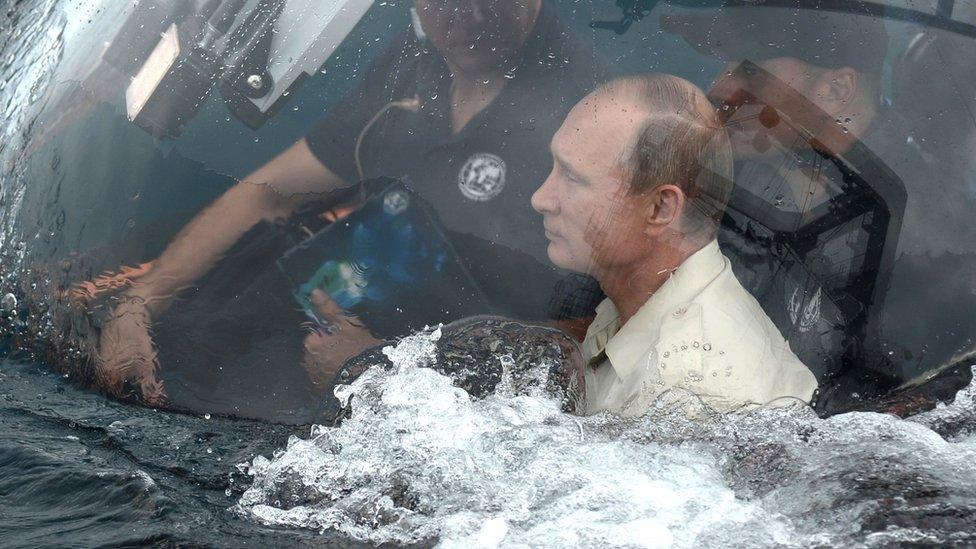Merkel and Putin: A grudging relationship
- Published
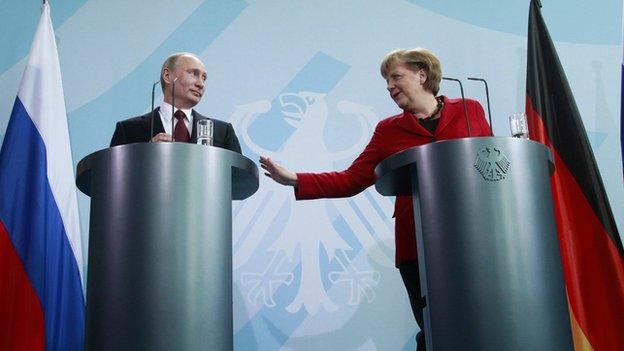
Putin and Merkel are said to have a grudging respect for each other
On Monday German Chancellor Angela Merkel will host a summit in Berlin about the conflict in eastern Ukraine.
French President Francois Hollande and Ukraine leader Petro Poroshenko are due to attend, but not Russian President Vladimir Putin. So how is the relationship between Mrs Merkel and Mr Putin?
They are the leaders of two of the most powerful countries in the world, they both grew up in communist states and they both had their careers transformed by its collapse.
But that's where the similarity ends.
One leader is a submarine-faring, external, bare-chested action-man, whose show-off, tough-guy image is intended to compensate for Russia's stalling economy, the head of a country accused of throwing its weight around and meddling militarily abroad.
The daredevil antics go down well with many Russian voters, traditionally partial to a strong leader.
Short on charisma
But the televised wrestling and horse-back riding is seen as comic by Western journalists, who sniggered at the Austen Powers baddie images of Mr Putin emerging from the waters of Crimea in a mini-submarine.
More "mid-life crisis red sports car" than "superpower leader", was the verdict internationally.
The other spends her summer holidays hiking in an anorak, and leads a country terrified of showing just how powerful it has become - usually dragging France along to crisis summits so that no one can accuse Berlin of getting pushy.
Unlike Russia, Germany in the past has often been accused of not doing enough with its power militarily - although, given how quickly the Nazi clichés have re-emerged during the Greek debt crisis, German reticence could now be seen as not entirely unjustified.

Ukraine's war: The human cost
6,832 people killed from mid-April 2014 to 27 July 2015, with 17,087 more injured
Fatalities include 298 people on Malaysia Airlines flight MH17, shot down on 17 July 2014
Around 1.3 million have difficulties in accessing safe drinking water
924,300 people displaced to neighbouring countries
Source: Figures from UN report, 14 August, external

The opposite of flamboyant, Mrs Merkel is renowned for giving speeches that are remarkable in just how unremarkable they are: cautious, covering every option and rarely coming down on one side of the fence or the other until it's clear what the mainstream opinion is.
Her name has even entered the German language as a verb - to "merkeln" - meaning not to make a decision.
As a British or American politician, she would be accused of indecision, frumpiness and lacking in charisma. But in Germany, where voters are suspicious of flashy superficiality, she is viewed as authentic.
And her unnerving habit of saying two opposing things at the same time fits in well with Berlin's consensual political culture.
The ageing ex-KGB macho man and the dowdy vicar's daughter - not exactly a match made in heaven and hard to know what they talk about. But they do talk.
Mr Putin may not be attending Monday's summit in Berlin but since the Ukraine crisis began Mrs Merkel has spoken on the phone to Mr Putin more often than any other Western leader has.
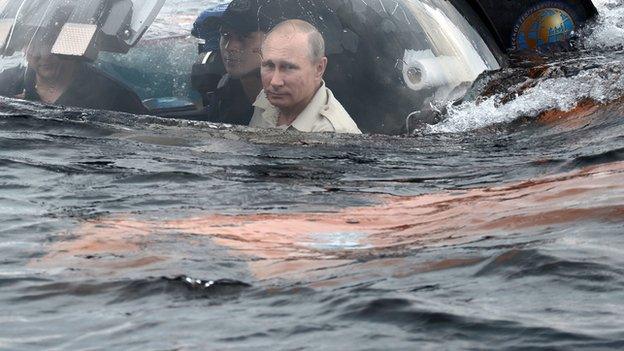
Putin's choreographed displays of machismo go down well with many Russian voters
She speaks Russian, having grown up in communist East Germany, and he speaks German, from his years working for the KGB in Dresden in the 1980s.
They are said to have a grudging respect for each other, although Mrs Merkel's adamant stance over sanctions and Mr Putin's denial of Russian action in Ukraine means that both sides now feel more of the grudging and less of the respect.
But Mrs Merkel, who says she is in it for the long haul, is not giving up. And her attitude towards Ukraine is shaped by her memories of how the seemingly intractable problem of a divided Germany was resolved in 1989.
Grinding negotiation
She experienced the fall of the Berlin Wall at first hand, while she was working as a scientist in East Berlin and her, now famous, decision to stick to her weekly sauna ritual instead of rushing to the newly opened border says a lot about her cautious personality.
But whereas American and British hawks believe the fall of the wall was the result of US President Ronald Reagan's tough militaristic stance with Moscow, for Mrs Merkel it was the result of decades of what Germans call "Ostpolitik, external", West Germany's patient policy to keep negotiating with communist leaders in the East.
Grinding, frustrating talks, which Berlin believes led eventually to German reunification.
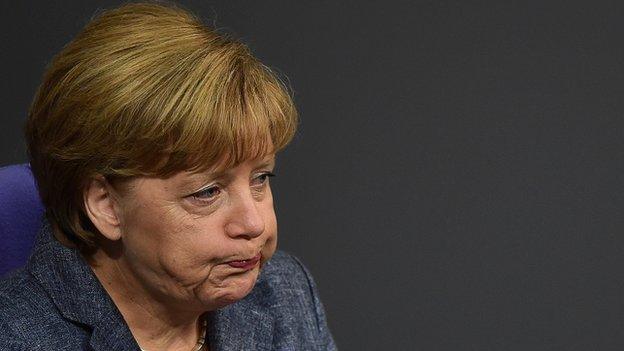
Angela Merkel's perceived lack of charisma is seen as one of her strengths in Germany
Bellicose rhetoric from politicians does not go down well with German voters. The mainstream view here is that sending in arms and troops to Ukraine would simply exacerbate the conflict.
After all, Germans remember what happened the last time Russia and the West clashed, during the Cold War: Germany ended up divided, torn down the middle.
"We are the ones who will feel the impact of an all-out war in Ukraine, not the Americans on the other side of the Atlantic," is a view you hear a lot here.
So Mrs Merkel believes that when it comes to Ukraine, it's talking - not fighting - that will resolve this crisis. Eventually.
- Published18 August 2015
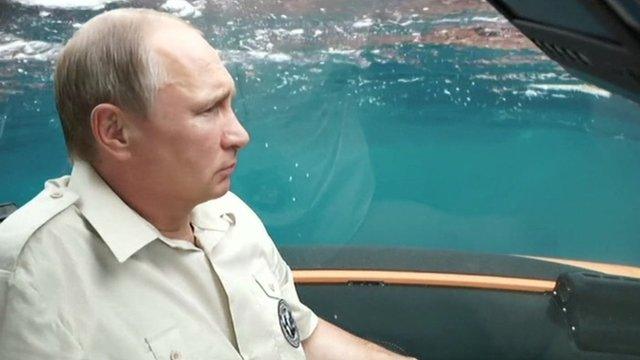
- Published19 August 2015
